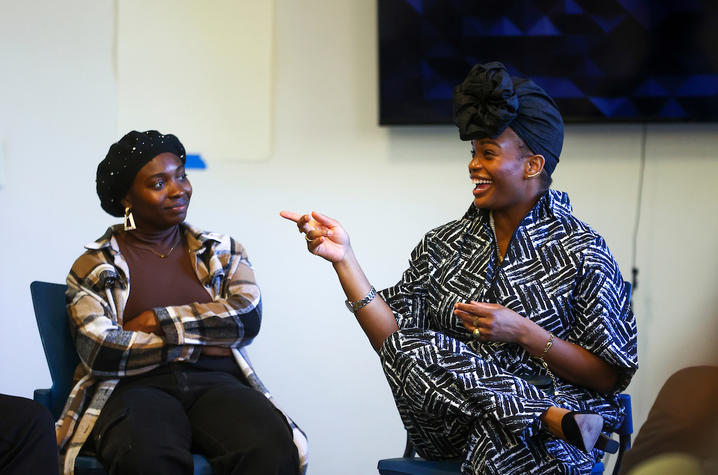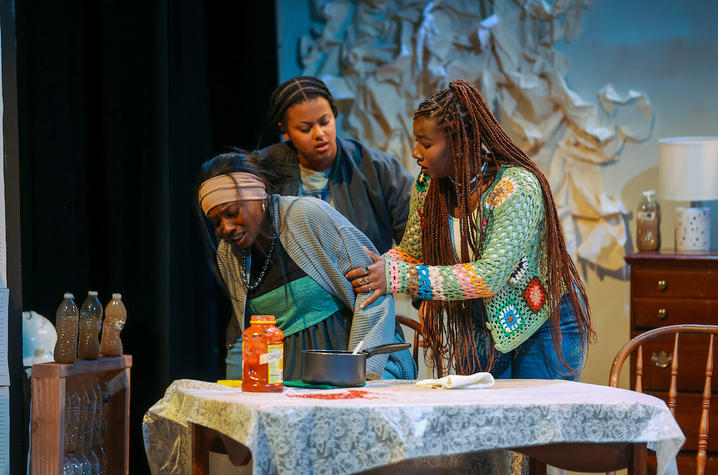Theatre students exposed to the hidden art of playwriting
LEXINGTON, Ky. (Nov. 8, 2024) — The curtain has fallen on University of Kentucky Theatre and Dance’s season-opening production “cullud wattah,” but the lessons remain.
It’s not often that students get to meet the writer who created the story, but UK Theatre and Dance Department Chair Susie Thiel and Assistant Professor Jeremy Gillett, who directed the production, brought playwright Erika Dickerson-Despenza to campus to meet with and answer questions from theatre and dance students. Her residency, which was supported by the College of Fine Arts, included a question-and-answer session following one of the performances and a guest lecture to theatre students on playwriting.
During an interview conducted in the middle of the play’s six-show run in October, Dickerson-Despenza, cast member Mya Barber, Gillett and Thiel talked about the benefits of exposing future theatre professionals to established figures, like playwrights, in that artistic community.
“To hear her passion behind not just ‘cullud wattah,’ but her other work, I think that just changes the way you perform as an actor because you’re working on your own passion, but when you hear other people’s passion, it just gives you another outlook on how to portray the story you’re telling,” said Barber, a senior triple major in vocal performance, theatre and communication.
Gillett said that as a director and a Black man, it’s important to him that theatre students see examples of themselves represented at high levels, and that Dickerson-Despenza, as a Black playwright, is showing students how to occupy those professional spaces.
“And because of that communal experience, I think it’s important that our students have an opportunity to interact with someone who looks like them, who’s had those communal experiences too,” Gillett said.
As teachers, Gillett and Thiel are strong advocates for exposing their students to theatre professionals of all disciplines. Gillett said it can be a bravery test for students and faculty, but also an opportunity to demonstrate pride in their work.
“I want to stand by what our students are doing in the classroom, so it’s actually really risky to invite a playwright who you’ve never worked with, who’s never seen your work. It could fall flat on its face and there’s the potential for Erika to despise everything we’re doing.
“So (bringing in professionals shows) a confidence in what our students are doing and what we’re teaching them; that UK is doing good work here,” Gillett continued. “We want to stand by that.”
Thiel said the department wants to show students the gamut of opportunities available on stage and behind the scenes, and that playwriting is integral to any production. Without the script, there’s no story.
“We bring in guest directors, choreographers, actors,” Thiel said, “so why wouldn’t we also bring in a playwright to talk to our students and show our students that this is all attainable and possible.”
“And that we’re people just like them,” Dickerson-Despenza added.
Although their importance to the production is integral — without the script there is no story — Dickerson-Despenza said playwrights are mostly unseen, and consequently they aren’t asked to speak to students.
“I didn’t have a playwright come in my theatre class who looked like me, or ever,” she said. “They just weren’t there, you know. It was the actors coming in and the singers coming in. So, I never saw a living Black woman playwright up close who was making her entire living by writing theatre.”
Dickerson-Despenza hopes students will take advantage of the opportunities to meet theatre professionals when they come to campus, and her biggest piece of advice is to pick their brains.
“You should be asking questions, and not questions about the glamour of the business, like how do you get on Broadway,” she said. “Ask ‘How do I get produced?’ ‘What is the process of going from first draft to production?’ ‘What does that timeline look like?’ ‘How do I do my taxes as a writer versus an actor?’
“People think that this particular field is way more glamorous than it is, and you don’t experience even that until you are at a certain level. So, it’s the practical advice: ‘How do I find time to write while I’m also working my survival job?’ ‘How do I create discipline?’”
She emphasized the importance of networking because writing mostly is a solitary pursuit, and when the play is finished, a writer must get it staged. She advised students to stay connected with their classmates, friends and others at the same level, and not necessarily with those above them in professional accomplishment.
“Those opportunities are going to come horizontally, not vertically,” she said. “Almost every opportunity I have had has come from my peers and not my superiors.”
As the state’s flagship, land-grant institution, the University of Kentucky exists to advance the Commonwealth. We do that by preparing the next generation of leaders — placing students at the heart of everything we do — and transforming the lives of Kentuckians through education, research and creative work, service and health care. We pride ourselves on being a catalyst for breakthroughs and a force for healing, a place where ingenuity unfolds. It's all made possible by our people — visionaries, disruptors and pioneers — who make up 200 academic programs, a $476.5 million research and development enterprise and a world-class medical center, all on one campus.






